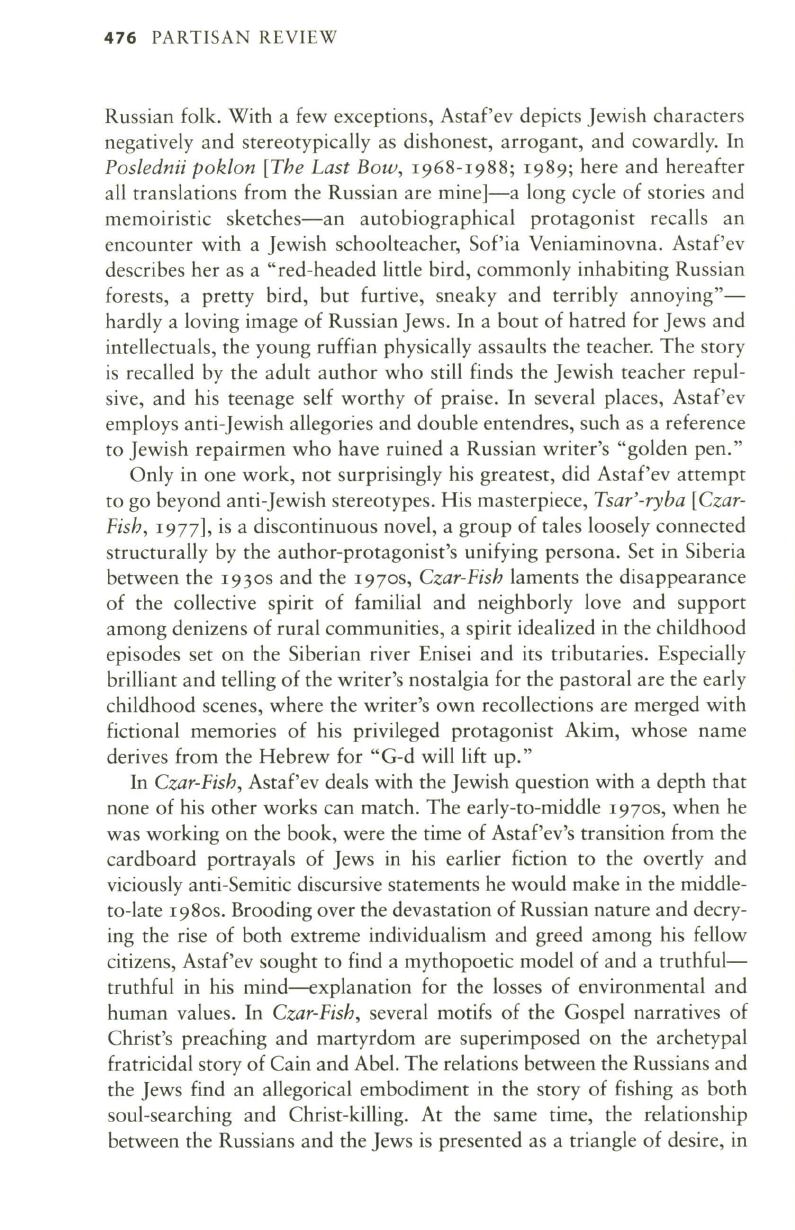
476
PARTISAN REVIEW
Russian folk. With a few exceptions, Astaf'ev depicts Jewish characters
negatively and stereotypically as dishonest, arrogant, and cowardly. In
Poslednii poklon [The Last Bow,
1968-1988; 1989; here and hereafter
all translations from the Russian are mine]-a long cycle of stories and
memoiristic sketches-an autobiographical protagonist recalls an
encounter with a Jewish schoolteacher, Sof'ia Veniaminovna. Astaf'ev
describes her as a "red-headed little bird, commonly inhabiting Russian
forests, a pretty bird, but furtive, sneaky and terribly annoying"–
hardly a loving image of Russian Jews. In a bout of hatred for Jews and
intellectuals, the young ruffian physically assaults the teacher. The story
is recalled by the adult author who still finds the Jewish teacher repul–
sive, and his teenage self worthy of praise. In several places, Astaf'ev
employs anti-Jewish allegories and double entendres, such as a reference
to Jewish repairmen who have ruined a Russian writer's "golden pen."
Only in one work, not surprisingly his greatest, did Astaf'ev attempt
to go beyond anti-Jewish stereotypes. His masterpiece,
Tsar'-ryba [Czar–
Fish,
1977], is a discontinuous novel, a group of tales loosely connected
structurally by the author-protagonist's unifying persona. Set in Siberia
between the 1930S and the 1970s,
Czar-Fish
laments the disappearance
of the collective spirit of familial and neighborly love and support
among denizens of rural communities, a spirit idealized in the childhood
episodes set on the Siberian river Enisei and its tributaries. Especially
brilliant and telling of the writer's nostalgia for the pastoral are the early
childhood scenes, where the writer's own recollections are merged with
fictional memories of his privileged protagonist Akim, whose name
derives from the Hebrew for" G-d will lift up."
In
Czar-Fish,
Astaf'ev deals with the Jewish question with a depth that
none of his other works can match. The early-to-middle 1970s, when he
was working on the book, were the time of Astaf'ev's transition from the
cardboard portrayals of Jews in his earlier fiction to the overtly and
viciously anti-Semitic discursive statements he would make in the middle–
to-late 1980s. Brooding over the devastation of Russian nature and decry–
ing the rise of both extreme individualism and greed among his fellow
citizens, Astaf'ev sought to find a mythopoetic model of and a truthful–
truthful in his mind--explanation for the losses of environmental and
human values. In
Czar-Fish,
several motifs of the Gospel narratives of
Christ's preaching and martyrdom are superimposed on the archetypal
fratricidal story of Cain and Abel. The relations between the Russians and
the Jews find an allegorical embodiment in the story of fishing as both
soul-searching and Christ-killing. At the same time, the relationship
between the Russians and the Jews is presented as a triangle of desire, in


